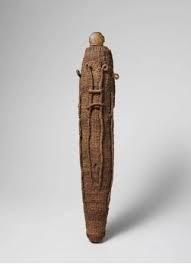History and Origin of Oro in Nigeria
In precolonial times the Orò cult performed legislative, executive and judicial functions in the Yoruba society.
The origin of Orò can be found in the Ẹ̀gbá subgroup around the town of Abẹ́òkúta, from where it diffused among the Yoruba subgroups of the Ìjẹ̀bu, Ẹ̀gbádò and Àwórì.
The cult started to decline when the British established their protectorate in Nigeria at the end of the 19th century and the traditional rulers lost their political influence.
Orò executed criminals, could exile persons out of town (or sold them into slavery) and cleansed the community of witchcraft.
Orò is a kind of male counterpart to the Iyáàmi, the female witches, and their senior lady Ontótóo.
Orò is a Yoruba ancestor cult, like the better known egúngún cult, they can be called "twin brothers". Both manifest themselves in annual masquerader festivals.
The devotees of Orò direct their attentions to a collective of ancestors rather than to personal ones.
Spirits of the dead play an active role in the daily life of the living, they are sought of for protection,guidance and are being consulted via means of divination.
Orisha Orò commands the spirits of the executed criminals and those who have spilled human blood upon the earth, what onlythe most powerful players could do in the past, theỌba(kings),Ògbóni members and Ifa diviners.
With his power Orò lets those deceased ancestors intercede in present day human affairs to establish social orderin the community. At the burial of deceased Orò members,ìsìnkú, Orò rituals will be performed as a rite of passage.
Necromancing, ìpàdẹ, allows to consult the soul of the deceased members to clarify contending issues. In the Oròópagi ceremony (literally killing or eating of a tree) the clothes of a deceased person appear hanging on a tree, that is stripped completely of its leaves by magic incantations. Especially important is this for the Ọba, the king.
When installed on the throne the king becomes èkejí Òrìṣà, a partly de-individualized demigod for the rest of his earthly lifetime. After his death his individual soul has to go through a set of ceremonies to get relieved from the immortal existence of the Ọba.This is directed by the Orò cult-members.
Although Orò lost his official political power the Orisha is still worshiped upto today in Yoruba towns to ensure peace and to ward off evil in the community.
The annual festival, Oròdóko, when Orò comes out of the sacred forest, is usually held at the end of the yam harvest season around August and lasts for several days. In modern towns this can cause conflicts on various levels.
Yoruba belief demands women and children staying at home during these days, as they must never see the Orò procession moving through town. If they did, they would get killed by Orò, as it is an absolute taboo for women to see the virile entity of Orò.
According to Adunni Olorisa even to encounter an Orò possession, or wander into the Orò groves, would be catastrophic to the traditionally attuned woman.
The woman who enters there on purpose or even by accident will be barren for the rest of her life or give birth to a monster, begotten by one of Orò's slaves,ẹrú, the criminals executed by him also called páakọ̀kọ̀ .
During festival time he takes over the land outside, "Orò gb’ode", and takes with him all those criminals and offenders who have to be punished. In the past beheaded corpses could be found after Orò was out in town, or people just disappeared and never have been seen again, with their clothes hanging in trees. Orò took them away.
The sound of the bull roarer announces the coming of Orò’s terrifying activities and men on the streets are shouting "Páakọ̀kọ̀, páakọ̀kọ̀!", calling the spirits of executed criminals that are always accompanying the Orisha. During festival time public life and business in the streets can get interrupted severely.Modern lifestyle, Christianity, Islam and traditional belief get into conflict.
Ethnic diversity in modern towns is also part of today’s struggle with the cult of Orò. In 1999 around 60 people got killed in ethnic conflicts at Sagamu,a small town northeast of Lagos.
A Hausa woman was out on the streets at night during Orò procession and died, what led to more violent outbursts between the Yoruba and the Hausa people..










.jpg)